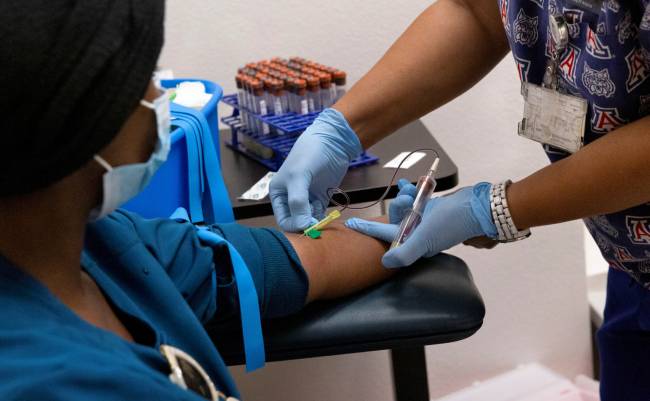Researchers report a powerful, long-lasting immune response in blood samples from recovered patients.
Can immunity to Coronavirus last for a long time? A new study offers the most hopeful answer yet to a question that has shadowed plans for widespread vaccination for decades.
The new data shows that most people who have recovered from infection still have enough immune cells to fight off the virus. The slow decline in the short term suggests that these cells may persist in the body for a very long time.
Neither peer-reviewed nor published in a scientific journal, the research was published online. To date, it is the most comprehensive and long-ranging study of immune memory to the Coronavirus.
“People with such a large amount of memory would likely avoid hospitalization or severe diseases for many years,” said Shane Crotty, a virologist at the La Jolla Institute of Immunology.
Vaccines might have to be administered repeatedly to keep the pandemic under control, if immunity to the virus is short-lived. Experts are likely to be relieved by the findings.
Researchers also found that survivors of SARS, caused by another Coronavirus, still carry certain immune cells 17 years after recovery.
Other labs have also reported encouraging findings. Marion Pepper, an immunologist at the University of Washington, had previously shown that certain “memory” cells produced after infection with the Coronavirus persist for at least three months.
Even when antibodies are not detectable, people who recovered from Covid-19 have powerful and protective killer immune cells.
The studies “all show that once you get past those first few critical weeks, the rest of the response looks pretty conventional,” said Deepta Bhattacharya, an immunologist at the University of Arizona.
Despite this, Akiko Iwasaki, an immunologist at Yale University, was heartened by the research: “This is exciting news.”
After recovering from Coronavirus infection, a small number of people in the new study did not have long-lasting immunity, perhaps due to differences in the amount of Coronavirus they were exposed to. Jennifer Gommerman, an immunologist at the University of Toronto, says vaccines can overcome individual variability.
“That will focus the response so you don’t get the same level of heterogeneity as in an infected population,” she said.
Recently, reports of waning antibody levels have raised concern that immunity to the Coronavirus may disappear in a few months, making people vulnerable again.
However, many immunologists have noted that a drop in antibody levels is natural. In addition, antibodies are only one part of the immune system.
Immune cells that “remember” the virus are responsible for preventing serious illness more often than antibodies that block the virus.
“Sterilizing immunity isn’t common – that’s not the norm,” said Doctor, co-leader of the study at the La Jolla Institute of Immunology.
In most cases, people become infected a second time with a particular pathogen, and the immune system recognizes it and extinguishes it quickly. Coronaviruses, in particular, are slow-acting, giving the immune system plenty of time to respond.
“You may not only not experience symptoms but you may not be infectious as well,” Doctor explained.
In their study, Doctor and his colleagues recruited 185 people who had recovered from Covid-19, ranging in age from 19 to 81. A majority of patients had mild symptoms that did not require hospitalization; most provided only one blood sample, but 38 provided multiple samples over a long period of time.
Four components of the immune system were tracked: antibodies, B cells that make antibodies, and two types of T cells that kill other infected cells. In order to build a picture of the immune response over time, its constituents were examined.
“You can miss the whole picture if you only consider one,” Doctor said.
Despite 200-fold differences in levels among participants, he found that antibodies were durable, declining only modestly six to eight months after infection. In the body, T cells showed only a slight, slow decay, while B cells increased in number – an unexpected finding the researchers cannot quite explain.
According to experts, the study is the first to examine the immune response to a virus in such detail. “We have no priors here,” Doctor said. For the first time, we’re learning about some of the dynamics of these populations over time.”
Research into viruses causing common colds has sparked concerns about how long immunity to the Coronavirus lasts. Jeffrey Shaman of Columbia University led a study that suggested immunity might fade quickly and reinfections could occur within one year.
“We need to be mindful of whether reinfection will be a problem,” Doctor said. This kind of persistent, robust response, at least to these timescales, is very encouraging.” He noted that we have not seen many reinfections with the Coronavirus so far.
Scientists don’t yet know how many immune cells are needed to protect against the virus, so it’s hard to predict how long immunity lasts. According to studies so far, even small numbers of antibodies or T and B cells may be enough to protect those who have recovered.
Participants in the study are making those cells in robust amounts so far. “Memory cells are not suddenly plummeting, which would be unusual,” Doctor said. “Usually, decay occurs slowly over time.”
Doctor noted that some emerging evidence suggests that reinfections with common cold coronaviruses are caused by genetic variations of the virus, so these concerns may not apply to the new coronavirus.
“In my opinion, it’s not unreasonable to expect these immune memory components to last for years,” he said.

